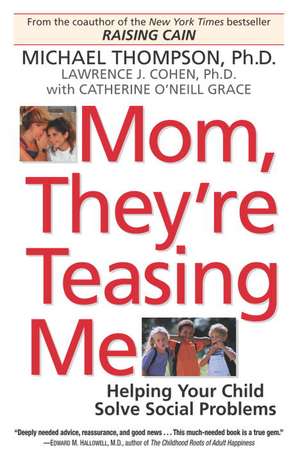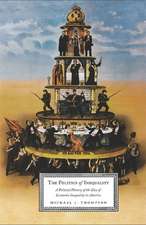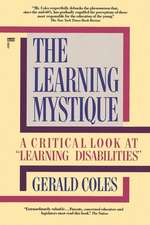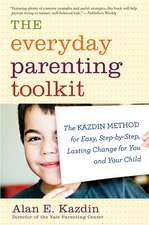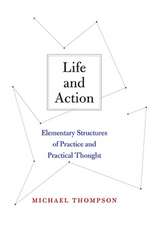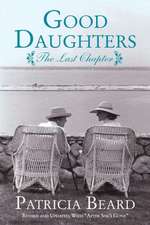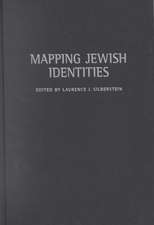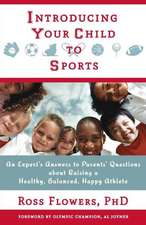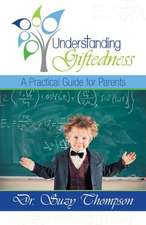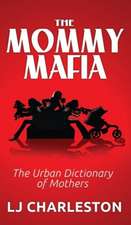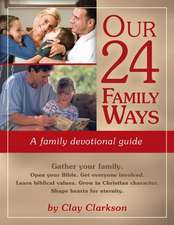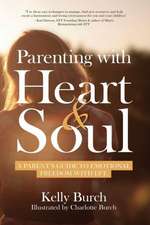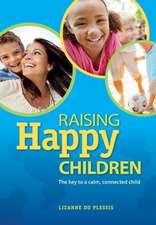Mom, They're Teasing Me: Helping Your Child Solve Social Problems
Autor Michael Thompsonen Limba Engleză Paperback – 31 iul 2004
• The difference between real risk and normal social pain
• The appropriate time to intervene–and when to step back
• Tips on how to mediate between children–without appearing meddlesome
• The importance of teaching and encouraging leadership
• The redemptive power of friendship
Mom, They’re Teasing Me answers key questions about the many manifestations of social cruelty, offers compelling descriptions of prime “teasing” scenarios, and illustrates how to counter them. It is an indispensable book for involved parents who want to make their child’s formative years rich and rewarding.
Preț: 104.25 lei
Nou
Puncte Express: 156
Preț estimativ în valută:
19.95€ • 21.33$ • 16.63£
19.95€ • 21.33$ • 16.63£
Carte disponibilă
Livrare economică 27 martie-10 aprilie
Preluare comenzi: 021 569.72.76
Specificații
ISBN-13: 9780345450111
ISBN-10: 0345450116
Pagini: 272
Dimensiuni: 124 x 213 x 15 mm
Greutate: 0.29 kg
Ediția:Trade Pbk.
Editura: BALLANTINE BOOKS
ISBN-10: 0345450116
Pagini: 272
Dimensiuni: 124 x 213 x 15 mm
Greutate: 0.29 kg
Ediția:Trade Pbk.
Editura: BALLANTINE BOOKS
Notă biografică
Michael Thompson, Ph.D., is a psychologist, lecturer, consultant, and former seventh-grade teacher. He conducts workshops on social cruelty, children’s friendships, and boys’ development across the United States. He is the author of Speaking of Boys and coauthor of the New York Times bestseller Raising Cain, as well as Best Friends, Worst Enemies, with Catherine O’Neill Grace and Lawrence J. Cohen. The father of a daughter and a son, he and his wife live in Arlington, Massachusetts. Lawrence J. Cohen, Ph.D., is a psychologist and the author of Playful Parenting. He is also a columnist for The Boston Globe. He lives in Brookline, Massachusetts, with his wife and daughter. Catherine O’Neill Grace is the author of numerous nonfiction books for children and was a former middle school teacher. For fifteen years she wrote a Washington Post column for young readers about health and psychology. She and her husband live in Waltham, Massachusetts.
From the Hardcover edition.
From the Hardcover edition.
Extras
THE EVERYDAY LIVES OF CHILDREN: Normal Social Pain
Every morning when the buses pull up in front of an elementary,
middle, or high school building, an extraordinary
social drama unfolds. Most adults miss the importance
of this opening act of the school day, because it is a daily theater,
apparently so predictable that grown-ups are not alert
to its intensity. But kids get off the bus with their minds
geared not to Spanish, spelling, or computer class, but to
seeing their friends. They're ready for the curtain to rise on
the action of the day--for the conflict and connection of social
life.
Children suffer when they are teased or excluded or
have a fight with a friend--and parents suffer emphatically
right along with them. Our job is to bear that pain and
also to put it in perspective. After all, we lived through
cliques and betrayals and heartaches, and our children will
too. Of course, there are things we can do to ease the pain--
theirs and ours--but our first job is to take a deep breath and
trust in children's resilience and in the process of human
development.
The social troubles children face are so predictable and
inevitable that it is hard to call them traumas. Nevertheless,
they do hurt and they do sap a child's confidence. Losing a
friend, having a secret betrayed, and being teased are just a
few examples. As parents, we want desperately to help children
escape these hard lessons of life, or at least master them
when they do happen. We know that lectures don't really
work, but we keep giving them anyway, just in case. We
aren't sure what else to do. We also know that our own endless
worrying doesn't help, but we have a hard time turning
it off.
Research shows that the majority of kids fall somewhere
in the middle of the social hierarchy. Their status ranges
from basically accepted to well liked to wildly popular. For
these children, intense social issues (and pain) are still prevalent.
In fact, pressures and conflicts are universal as kids
deal with clashes among the individual, the friendship pair,
and the group. Most of the answers to the questions in this
section begin with reassurance. Our goal is to help adults
understand such factors as temperament, group dynamics,
and child development. Our hope is that a better understanding
of these things will provide some perspective, a
dose of optimism, and a little relief from the anxiety we feel.
Parents and other adults all have their own painful memories
of social struggles. These memories are triggered when children
hand over their pain to their parents. It's hard to separate
the new pain of your child's present from the old pain of
your own school days. It's a bit like getting your toe stepped
on when it's already broken.
When we label much of what you worry about as "normal"
social pain, we do not in any way mean to trivialize it.
The pain we feel when we lose a loved one is universal too--
and therefore "normal." But that does not lessen its sting. In
fact, knowing that something is universal, that you and your
child are not the only people who ever went through this
pain, can be powerfully comforting.
If you read between the lines as you look over the questions
in this section, you'll see that more often than not, what
parents and teachers are really asking is this: "Is my child
normal?" "Are the children in my class normal?" There is
often a great deal of anxiety and concern behind these questions.
Much uncertainty and anxiety comes from a lack of
experience about how normal it is for children to be in pain,
or how normal it is for children to be so difficult for adults to
understand and to handle. Normal children are not wonderful
every minute. Their friendships aren't always a scene on
a Hallmark card. In fact, they throw us all kinds of curve
balls. I often share with parents this quote from the brilliant
child psychiatrist D. W. Winnicott in his book The Child,
The Family, and the Outside World, "What is the normal
child like? Does he just eat and grow and smile sweetly? No,
that is not what he is like. A normal child, if he has confidence
in his father and mother, pulls out all the stops. In the
course of time he tries out his power to disrupt, to destroy, to
frighten, to wear down, to waste, to wangle and to appropriate.
Everything that takes people to the courts (or to the asylums,
for that matter) has its normal equivalent in infancy
and early childhood (and in adolescence), in the relation
of the child to his own home. If the home can stand up to all
the child can do to disrupt it, he settles down to play; but
business first, the tests must be made."
We have to bear the pain that our children share with us,
pain that might break our hearts or annoy us or remind us of
our own horrible peer experiences. And we have to keep a
sense of perspective about all that pain. Indeed, the first rule
of worrying as a parent is to take the long view.
There is a story about an anxious first-time mother
who called her baby's pediatrician constantly, sometimes
several times a day. After a couple of months of this, he asked
to see her. This is what he said: "Mrs. Smith, you have given
birth to a child. You have opened yourself up to a lifetime
of worry. You have to pace yourself." Kids, too, need
to learn to pace themselves in the long-distance race of growing
up.
In the first of the two case studies that follow, you will
meet a mother who learned to manage her worry and to promote,
rather than anguish about, her child's friendships.
The second case study in this section will introduce you
to Karen, a young adult, and her reflections about the complex
interplay of identity, friendship, and popularity during
adolescence. Karen's ability to look back on her own social
life helps her make sense of a struggle that was hard to
understand when she was living through it. We hope her
view will give you added perspective on your own children's
experiences in the world of friendship and popularity.
From the Hardcover edition.
Every morning when the buses pull up in front of an elementary,
middle, or high school building, an extraordinary
social drama unfolds. Most adults miss the importance
of this opening act of the school day, because it is a daily theater,
apparently so predictable that grown-ups are not alert
to its intensity. But kids get off the bus with their minds
geared not to Spanish, spelling, or computer class, but to
seeing their friends. They're ready for the curtain to rise on
the action of the day--for the conflict and connection of social
life.
Children suffer when they are teased or excluded or
have a fight with a friend--and parents suffer emphatically
right along with them. Our job is to bear that pain and
also to put it in perspective. After all, we lived through
cliques and betrayals and heartaches, and our children will
too. Of course, there are things we can do to ease the pain--
theirs and ours--but our first job is to take a deep breath and
trust in children's resilience and in the process of human
development.
The social troubles children face are so predictable and
inevitable that it is hard to call them traumas. Nevertheless,
they do hurt and they do sap a child's confidence. Losing a
friend, having a secret betrayed, and being teased are just a
few examples. As parents, we want desperately to help children
escape these hard lessons of life, or at least master them
when they do happen. We know that lectures don't really
work, but we keep giving them anyway, just in case. We
aren't sure what else to do. We also know that our own endless
worrying doesn't help, but we have a hard time turning
it off.
Research shows that the majority of kids fall somewhere
in the middle of the social hierarchy. Their status ranges
from basically accepted to well liked to wildly popular. For
these children, intense social issues (and pain) are still prevalent.
In fact, pressures and conflicts are universal as kids
deal with clashes among the individual, the friendship pair,
and the group. Most of the answers to the questions in this
section begin with reassurance. Our goal is to help adults
understand such factors as temperament, group dynamics,
and child development. Our hope is that a better understanding
of these things will provide some perspective, a
dose of optimism, and a little relief from the anxiety we feel.
Parents and other adults all have their own painful memories
of social struggles. These memories are triggered when children
hand over their pain to their parents. It's hard to separate
the new pain of your child's present from the old pain of
your own school days. It's a bit like getting your toe stepped
on when it's already broken.
When we label much of what you worry about as "normal"
social pain, we do not in any way mean to trivialize it.
The pain we feel when we lose a loved one is universal too--
and therefore "normal." But that does not lessen its sting. In
fact, knowing that something is universal, that you and your
child are not the only people who ever went through this
pain, can be powerfully comforting.
If you read between the lines as you look over the questions
in this section, you'll see that more often than not, what
parents and teachers are really asking is this: "Is my child
normal?" "Are the children in my class normal?" There is
often a great deal of anxiety and concern behind these questions.
Much uncertainty and anxiety comes from a lack of
experience about how normal it is for children to be in pain,
or how normal it is for children to be so difficult for adults to
understand and to handle. Normal children are not wonderful
every minute. Their friendships aren't always a scene on
a Hallmark card. In fact, they throw us all kinds of curve
balls. I often share with parents this quote from the brilliant
child psychiatrist D. W. Winnicott in his book The Child,
The Family, and the Outside World, "What is the normal
child like? Does he just eat and grow and smile sweetly? No,
that is not what he is like. A normal child, if he has confidence
in his father and mother, pulls out all the stops. In the
course of time he tries out his power to disrupt, to destroy, to
frighten, to wear down, to waste, to wangle and to appropriate.
Everything that takes people to the courts (or to the asylums,
for that matter) has its normal equivalent in infancy
and early childhood (and in adolescence), in the relation
of the child to his own home. If the home can stand up to all
the child can do to disrupt it, he settles down to play; but
business first, the tests must be made."
We have to bear the pain that our children share with us,
pain that might break our hearts or annoy us or remind us of
our own horrible peer experiences. And we have to keep a
sense of perspective about all that pain. Indeed, the first rule
of worrying as a parent is to take the long view.
There is a story about an anxious first-time mother
who called her baby's pediatrician constantly, sometimes
several times a day. After a couple of months of this, he asked
to see her. This is what he said: "Mrs. Smith, you have given
birth to a child. You have opened yourself up to a lifetime
of worry. You have to pace yourself." Kids, too, need
to learn to pace themselves in the long-distance race of growing
up.
In the first of the two case studies that follow, you will
meet a mother who learned to manage her worry and to promote,
rather than anguish about, her child's friendships.
The second case study in this section will introduce you
to Karen, a young adult, and her reflections about the complex
interplay of identity, friendship, and popularity during
adolescence. Karen's ability to look back on her own social
life helps her make sense of a struggle that was hard to
understand when she was living through it. We hope her
view will give you added perspective on your own children's
experiences in the world of friendship and popularity.
From the Hardcover edition.
Recenzii
“Deeply needed advice, reassurance, and good news . . . This much-needed book is a true gem.”
–EDWARD M. HALLOWELL, M.D., author of The Childhood Roots of Adult Happiness
“A VALUABLE RESOURCE . . . [The authors] help parents deal with a range of social problems. . . . Just as important, they help parents distinguish between the kind of social antagonisms that can traumatize a child and the kind that are just part of growing up.”
–Booklist
“Once again Michael Thompson, Lawrence Cohen, and Catherine O’Neill Grace have reached into the hearts and minds of children and parents and given us deeply needed advice, reassurance, and good news. They show us how to deal with some of the most painful moments of childhood and, not only survive them, but thrive. Michael Thompson combines the knowledge and wisdom of a brilliant psychologist with the heart and love of an experienced parent. This much-needed book is a true gem.”
–EDWARD M. HALLOWELL, M.D.
“Few parenting challenges compare to helping a kid cope with teasing or being left out. With empathy and understanding, Mom, They’re Teasing Me gives parents age-by-age information and practical advice to guide and comfort kids through every stage of their so-called social lives.”
–FREDDI GREENBERG
Editor in Chief, Nick Jr. magazine
“What a wonderful and helpful book. It is right on target dealing with a very difficult issue–one that all parents confront–in a truly sensitive and intelligent manner. Above all, Michael Thompson and Lawrence Cohen give answers–why it happens and what to do about it. I was really impressed by their ability to make helpful sense out of a truly difficult part of child-raising.”
–ANTHONY E. WOLF, Ph.D.
Author of Get Out of My Life, But First Could You
Drive Me and Cheryl to the Mall?
–EDWARD M. HALLOWELL, M.D., author of The Childhood Roots of Adult Happiness
“A VALUABLE RESOURCE . . . [The authors] help parents deal with a range of social problems. . . . Just as important, they help parents distinguish between the kind of social antagonisms that can traumatize a child and the kind that are just part of growing up.”
–Booklist
“Once again Michael Thompson, Lawrence Cohen, and Catherine O’Neill Grace have reached into the hearts and minds of children and parents and given us deeply needed advice, reassurance, and good news. They show us how to deal with some of the most painful moments of childhood and, not only survive them, but thrive. Michael Thompson combines the knowledge and wisdom of a brilliant psychologist with the heart and love of an experienced parent. This much-needed book is a true gem.”
–EDWARD M. HALLOWELL, M.D.
“Few parenting challenges compare to helping a kid cope with teasing or being left out. With empathy and understanding, Mom, They’re Teasing Me gives parents age-by-age information and practical advice to guide and comfort kids through every stage of their so-called social lives.”
–FREDDI GREENBERG
Editor in Chief, Nick Jr. magazine
“What a wonderful and helpful book. It is right on target dealing with a very difficult issue–one that all parents confront–in a truly sensitive and intelligent manner. Above all, Michael Thompson and Lawrence Cohen give answers–why it happens and what to do about it. I was really impressed by their ability to make helpful sense out of a truly difficult part of child-raising.”
–ANTHONY E. WOLF, Ph.D.
Author of Get Out of My Life, But First Could You
Drive Me and Cheryl to the Mall?
Descriere
From the acclaimed authors of "Best Friends, Worst Enemies" comes the perfect companion volume: a practical, how-to guide for parents to help their children navigate the sometimes harsh terrain of social life.
